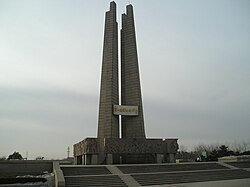Tangshan
| Tángshān Shì 唐山 市 Tangshan |
||
|---|---|---|
|
|
||
| Coordinates | 39 ° 38 ′ N , 118 ° 11 ′ E | |

|
||
| Basic data | ||
| Country | People's Republic of China | |
| Hebei | ||
| ISO 3166-2 | CN-HE | |
| surface | 13,472 km² | |
| Residents | 7,596,300 (2016) | |
| density | 563.9 Ew. / km² | |
| Website | www.tangshan.gov.cn | |
|
Memorial to the Tangshan Quake in 1976
|
||
Tangshan ( Chinese 唐山 市 , Pinyin Tángshān Shì ) is an important industrial city in the northeast of the Chinese province of Hebei with 2,128,191 inhabitants in the inner city area (2010 census).
geography
Tangshan is about 135 km east of the Chinese capital Beijing . It administers a territory of 13,472 km² with an east-west extension of about 130 km and a north-south extension of about 150 km.
Tangshan is connected to the Jingshen Highway, which runs from Beijing to Shenyang , via the highway ring surrounding the city , and to the southwestern city of Tianjin via the Tianjin Highway.
population
At the end of 2016, the Tangshan Territory had a total population of 7,596,300 people. Compared to the previous year, the population had increased by 46,771 people or 0.62%. There were 82,500 births and 21,300 deaths. The gender ratio is 102.5 men per 100 women.
Representatives of 52 national minorities live in Tangshan, a total of 324,900 people as of 2016. Of these, the Manchu with 256,100, the Hui with 34,100, Zhuang with 12,100 and the Mongols with 11,900 people are the most important.
history
Tangshan was shaken by a powerful earthquake on July 28, 1976 and was almost completely destroyed (see Tangshan earthquake, 1976 ). Today a stele in the main square in the center of the city and the earthquake information center , a museum that deals with earthquakes, commemorate the earthquake .
economy
According to a study from 2014 Tangshan has a gross domestic product of 162.32 billion US dollars in purchasing power parity. In the ranking of the economically strongest metropolitan regions worldwide, the city took 77th place. The GDP per capita is $ 20,974 (PPP).
Tangshan is the center of the Chinese steel industry. In 2016, 91.2 million tons were produced, more than the whole of the United States . Due to heavy industry, Tangshan is one of the most polluted cities in the country.
Administrative structure
As of the end of 2018, Tangshan was composed of seven urban districts , four districts, three independent cities and four development areas at the county level . These are:
- Municipalities Lubei (路北区), Lunan (路南区) Caofeidian (曹妃甸区), Kaiping (开平区), Guye (古冶区) Fengrun (丰润区) and Fengnan (丰南区)
- Qianxi (迁西县), Yutian (玉田 县), Luannan (滦南县), Laoting ( 乐亭 县) circles
- Independent cities of Qian'an (迁安 市), Luanzhou (滦 州市) and Zunhua (遵化 市)
- Development areas Haigang (海港 经济 开发区), High-Tech Park (高新技术 产业 开发区), Lutai (芦台 经济 技术 开发区) and Hangu (汉沽 管理 区)
At the municipal level, the above-mentioned administrative units consist of 45 municipalities and 132 large municipalities , at the village level of 5405 villages and 54 communities .
Town twinning
-
 Malmö , Sweden, since 1987
Malmö , Sweden, since 1987 -
 Sakata , Japan, since 1990
Sakata , Japan, since 1990 -
 Lincoln , United Kingdom, since 1992
Lincoln , United Kingdom, since 1992 -
 Cedar Rapids , United States, since 1997
Cedar Rapids , United States, since 1997
Web links
Individual evidence
- ↑ 地理位置.唐山 市 人民政府 主办, April 23, 2018, accessed June 12, 2019 (Chinese).
- ↑ a b 人口 民族.唐山 市 人民政府 主办, May 22, 2018, accessed June 12, 2019 (Chinese).
- ^ Alan Berube, Jesus Leal Trujillo, Tao Ran, and Joseph Parilla: Global Metro Monitor . In: Brookings . January 22, 2015 ( brookings.edu [accessed July 30, 2018]).
- ↑ Reuters Editorial: China's top steelmaking city set to deepen output curbs over summer . In: US ( reuters.com [accessed July 30, 2018]).
- ↑ 唐山 市. State Statistics Office of the People's Republic of China , accessed June 12, 2019 (Chinese).
- ↑ 行政 区划.唐山 市 人民政府 主办, May 22, 2018, accessed June 12, 2019 (Chinese).


